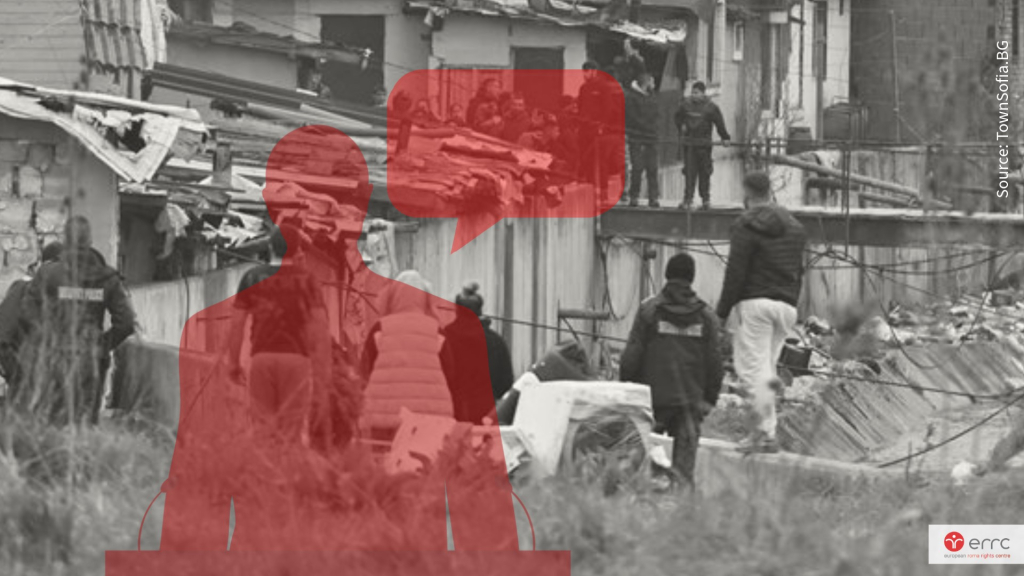‘Sugar Factory’ eviction scandal: Sofia mayor claims municipality acted legally and responsibly
22 July 2025

The scandal of the ‘Sugar Factory’ mass demolition of Romani family dwellings in Sofia took a new turn this month, with the lifting of interim measures by the Strasbourg Court prompting the municipality to make unfounded claims that they ‘responded immediately, with specific solutions for real people’; while the Bulgarian Helsinki Committee (BHC) countered that the administration continues to systematically violate the rights of the city’s most vulnerable residents.
On 10 July 2025, the European Court of Human Rights (ECtHR) lifted the interim measures imposed earlier this year concerning the demolition of dwellings in the Sugar Factory (Zaharna Fabrika) district of Sofia. Mainstream and social media echoed the claims of the deputy mayor that the court’s decision confirmed that “Sofia Municipality acted responsibly and in accordance with the law, even under crisis conditions.”
Not so, according to the Bulgarian Helsinki Committee, which stated that the lifting of interim measures is by no means a pronouncement by the Court on the wider issue: “The ECHR letter does not contain any assessments of ‘timely, effective and humane actions’ by any public authority in the Republic of Bulgaria regarding the removal of the hamlets in the Zaharna Fabrika district.”
The temporary measure related solely to whether there is an immediate risk of irreparable harm to 12 of the people who applied, some of whom have been accommodated in municipal shelters, while others have taken refuge with relatives and friends or found alternative rented accommodation without assistance from the authorities.
The cancellation of measures does not apply to the situation of 125 of those affected, according to the BHC. It is in the proceedings around the complaint communicated to the Bulgarian government concerning the 125 residents that it will be established whether or not the state has committed a violation.
The mayor claimed that the suspension of the interim measures meant that “Sofia Municipality has fulfilled its obligations under the European Convention on Human Rights … We will continue to uphold the principle that legality and social support should go hand in hand." According to the mayor, after the demolition on 15 April, Sofia Municipality promptly deployed field teams who offered temporary accommodation, medical assistance, social services, employment opportunities, and access to food and water: “A comprehensive assessment of the individual needs of all affected persons was conducted. As a result, 53 individuals accepted the support and were accommodated within social care facilities in Sofia.”
This account is completely at odds with what human rights observers on the ground encountered. In an open letter to the authorities on 17 April, the BHC condemned the illegal demolition, and called for urgent action to prevent a severe humanitarian crisis, as “for the third day now over 200 people, including children, the elderly and sick people, are living in the open air.” The conditions prompted Council of Europe Commissioner for Human Rights, Michael O’Flaherty on 25 April to call on Prime Minister Rosen Zhelyazkov to take immediate measures to ensure “the provision of emergency shelter, basic sanitary and hygienic conditions and access to essential health care, social services and legal aid for those concerned, and to prevent any violence against Roma.”
As for the much-touted offer of alternative accommodation, the municipality only offered places in the Centre for Temporary Accommodation, days after the demolition and only to a few of those affected. As the BHC reported, conditions in the centre do not allow families to be housed together, and according to those who went there, it is infested with cockroaches and bedbugs. Because of this, some of the people refused the proposed accommodation and continue to live in tents on the site of their destroyed homes.
While the deputy mayor of Sofia stated that “We will continue to uphold the principle that legality and social support should go hand in hand", the municipality stepped up the pressure, and on 7 July, the district mayor issued an order to seize the municipal property, and requested police assistance to remove the tents, toilets and sinks provided for shelter and personal hygiene. The Bulgarian Helsinki Committee is providing legal assistance to the people affected by the order to challenge it before the Sofia Administrative Court, and requested the city mayor cancel the district mayor’s order. No answer received as yet.
Emboldened by the expiry of the interim measures, the mayor and municipality have sought to wrap up the matter, claim their actions were smart solutions for real people – ‘timely effective and humane’ – and hope the world forgets this illegal action and its cruel consequences. As desperate families squat amidst the rubble of their former homes, justice seems a long way off.




